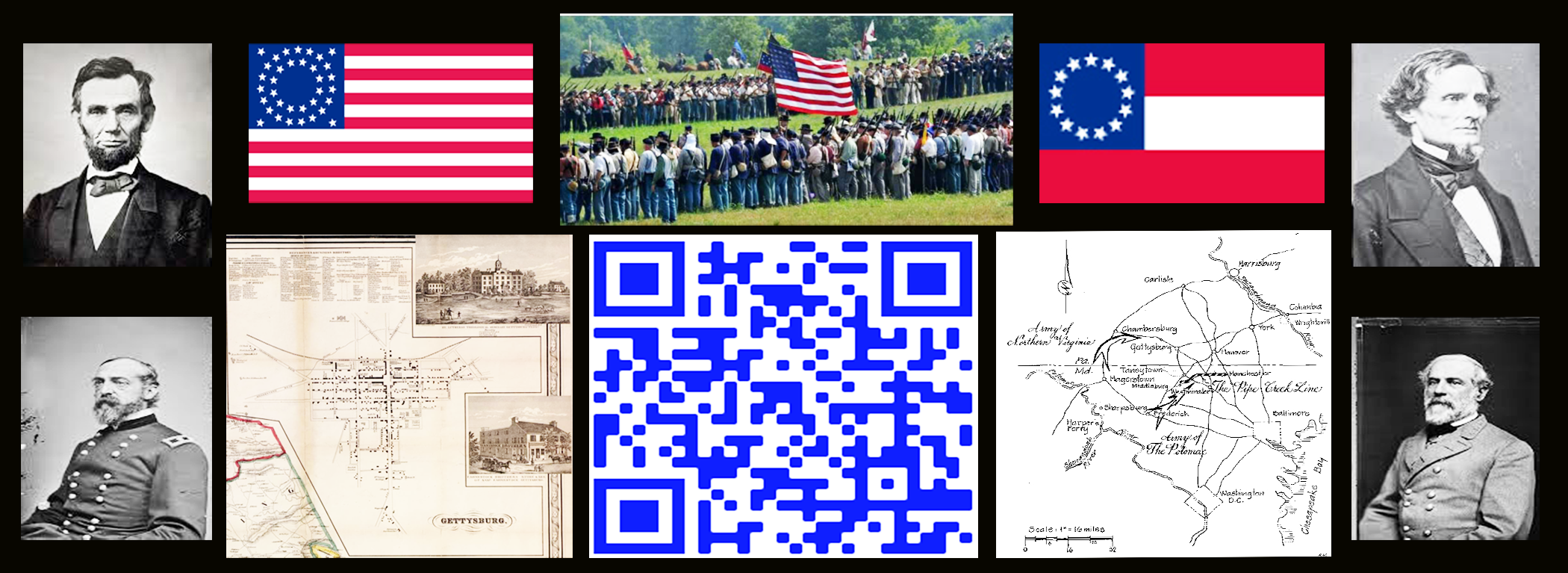Indeed, for Robert E Lee personally and the Army of Northern Virginia in general, Gettysburg was a costly defeat; tactically that is. Although he had lost tens of thousands WIA and KIA, perhaps the most severe losses were felt in his mid-echelon officer corps. In addition to Division Commanders Heth, Pender and Hood, he had lost some of his best brigade commanders (Brigadier Generals) and a slew of Colonels. The numbers of Majors and Captains lost was almost uncountable. Foot soldier can be replaced. True leaders have to be cultivated. His army was truly depleted of such personnel as he retreated.
And yet, there are aspects of the aftermath that could be considered to be a strategic victory. One of the factors that had driven Lee north was that his army was starving in NW Virginia. [Section 1f details some of the issues facing Lee in the spring of 1863.] On the way into Pennsylvania up the Cumberland Valley, Lee’s men had feasted on the bounty of the land. His quartermasters had ‘bought’ vast quantities of supplies of every imaginable variety. Livestock of all types were being herded back down into Virginia as the battle raged in southern PENN.
Add to this the 100+ wagons that Stuart’s Cavalry had ‘commandeered’ and the military supplies that Ewell had looted at Carlisle (although he was recalled before he could truly empty the warehouses) and the balance sheet of the spoils of war were in Lee’s favor.
[see Section 1f LOGISTICS]
In short, this rather brief incursion into the North had been costly in terms of personnel lost. But the spoils allowed him to regroup in Virginia and replace his manpower losses in due time. As such, he moved east again to protect Richmond and was able to battle on for two more years.
Soon after his return to Virginia, Lee penned a rather long letter of resignation — President Davis refused it. But in it there are telling insights. In one portion he states that “I am so dull in making use of the eyes of others I am frequently misled.” Could this be an admission that his failure to confirm certain of his beliefs led to major losses? For example, he held to the mis-conception that the Union left flank would be aligned along the Emmittsburg Road and failed to take measures to verify that error. Of course, no one could have anticipated MG Sickles massive ‘blunder’ in moving his troops without orders and thus completely disrupting Lee’s original attack plan. But is was also a major failure that no one in Lee’s chain of command made any attempt to notify him of this movement. The “eyes of others” might have been very helpful in the late morning of 2 JUL.
In another section, he seemingly alludes to the onset of angina that sapped his stamina that week. “I am becoming more and more incapable of exertion, and am thus prevented from making the personal examinations and giving the personal supervision to the operations in the field which I feel necessary.” Did that angina affect any future military operations? I will leave that question for true historians to address…
It is also apparent from post-Gettysburg comments and interviews that Lee had a different definition of ‘victory’ that did many of the journalists and politicians of the day. Over the years, Lee posited that he did not view even Gettysburg as a major failure; much based on the ‘logistical’ boon his army received. But that at the same time, he did not see Fredericksburg and Chancellorsville as the victories that they seemingly did. In these latter two encounters, he recognized that the loses the Union Army suffered were much more easily replaced than his own and that neither of those battles had ended with any significant gains by his forces. In both cases, the Army of the Potomac was simply able to withdraw, absorb those losses and then set out to determine the time and place of the next encounter. For Lee, the bold move of racing his army north was an attempt to break this cycle of ‘meaningless’ clashes. He had been forced into a series of defensive battles, just trying to keep Hooker’s army at bay. The northern invasion, as disappointing as it turned out, was his attempt to change the course of the war by seizing the initiative and going on the offensive. Perhaps this concept also partially explains his reluctance to accept Longstreet’s council to fight in a more cautious — even defensive — mode when the two armies finally met at Gettysburg.
Lee also posited that another series of clashes like Fredericksburg and Chancellorsville would easily have cost his army a similar number of casualties as did Gettysburg, all without the benefits he derived from that incursion. In one interview soon after Gettysburg, he lamented that the worse thing he could think of was to be forced to “retire to Richmond and stand a siege, which must ultimately have ended in surrender.” Ironically, this is exactly what happened in the latter months of the war two years hence!
